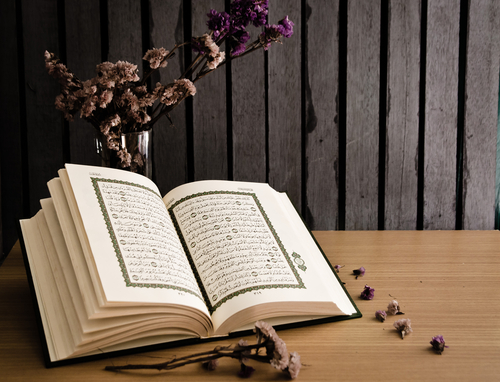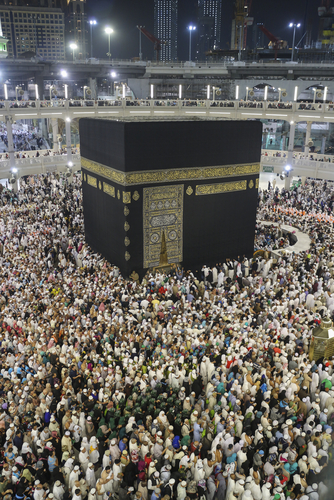The Pilgrimage of Hajj, Eid-ul-Adha and Qurbani 2016

There are many benefits surrounding the Qurbani sacrifice; first of all, we are fulfilling one of our five core obligations to Allah SWT, and second, we are giving to those in need at the same time.
Now, if you are reading this article, then chances are, meat is readily available in your country and local area. However, this is not always the case for everyone around the world. Meat is not always available in other countries worldwide, particularly those who are suffering from poverty throughout.
What is truly beautiful is that the act of Qurbani (Udhiya) is carried out following the performing of the obligatory Hajj pilgrimage on an annual basis; giving those who are in need, the opportunity to eat meat during the prosperous festival of Eid-ul-Adha.
The core obligations upon a Muslim in Islam are representative of The Five Pillars of Islam; each pillar represents an obligation.
These obligations consist of the following:
- Shahadah (Acknowledgement of Faith)
Shahadah is the strength of one’s faith, believing that there is no God but Allah SWT and Prophet Muhammad (PBUH) is His Messenger. Shahadah also entails a commitment to and following the path of Islam and abiding by its guidance as written in The Holy Qur’an.
- Salaah (Prayers)
Salaah (salat/namaz) means obligatory prayers. Every Muslim has an obligation to perform prayers five times in a day, at set times, every day. The prayer is known as time alone with your Creator, conversing with your Creator and worshipping your Creator.
Certain actions during the carrying out of the prayer demonstrate that from Allah SWT we have come and to Allah SWT we shall return.
Before performing salaah, wudhu (ablution) needs to be carried out; in order to attain purity and to clear the mind of any thoughts and purely be fixed on their Lord.
The reason behind salaah is simple; you pray for your own benefit, your Lord has directed this obligation upon you, for your own reward and benefit.
- Zakat (Giving to Charity)
The act of giving to charity and your generosity is rewarded greatly in Islam. However, there is also a compulsory zakat which is obligatory to all applicable Muslims. The act of zakat determines that each individual should give a set percentage (2.5%) of one’s profitable annual wealth to charity.
Not only is this act highly regarded by Allah SWT, but it also demonstrates the obeying of Allah SWT’s instruction and acknowledges that He can take from us as easily as He can give. It also demonstrates that nothing of material value in this world is truly ours. This helps discipline oneself and keeps oneself away from worldly greed, love of money and possessions. Zakat is seen as a form of tax.
Qurbani (Udhiya) is also a form of giving and sacrifice, but the significance of giving Qurbani applies to the occasion of Hajj.
- Sawm (Fasting)
Fasting during the month of Ramadan is an obligation placed upon Muslims between the hours of sunrise and sunset. The act of fasting is not just abstaining from food and drink during these hours, but its aim is to purify one’s mind, body and soul of all that is bad.
There are certain cases which are exempt from fasting, but a form of penalty is given by way of fidya.
- Hajj (Holy Pilgrimage to Mecca)
Hajj is known as the pilgrimage to Mecca and is obligatory at least once in a lifetime to all Muslims who are physically and financially able. Hajj promotes unity in Islam, and its significance is none other than displaying that we are all equal in the eyes of Allah SWT.
Pilgrims are to rid themselves of all worldly attire and adorn a simple ihram (plain, unstitched white cloth), to display equality regarding wealth, ego and status. Nobody is superior to anyone and we came with nothing, which is the way we shall leave.
The Occasion of Hajj
Occuring in the twelfth month of the Islamic lunar calendar – Dhu al Hijjah. This is shortly followed by the observance of Eid-ul-Adha, which celebrates the completion and privilege of Hajj, and is when the act of giving Qurbani is carried out.

The benefits surrounding the act of donating Qurbani include:
- Seeking Allah SWT’s pleasure
- Thanking Allah SWT for our blessings
- Helping others in less fortunate circumstances than ourselves
- Sharing the happiness of the day of Eid-ul-Adha and distributing nourishment amongst others so that they can celebrate in the same way
- Serves as a historical reminder of Prophet Ibrahim’s willingness to sacrifice his son, Hazrat Ismail, in his obedience and devotion to pleasing Allah SWT
There are specific requirements for Qurbani (Udhiya) involving the type of animal, amount of share, distribution and many other factors.
The Festival of Eid-ul-Adha
Eid-ul-Adha is the occasion which marks the completion and privilege of Hajj, and those who have successfully performed their obligation this year. This is also the day on which the act and distribution of Qurbani is carried out. Muslims worldwide adjoin and unite in a congregation of prayers, known as Eid Salah, at their local Mosque.
Following the accomplishment of the Eid prayer, Muslims embrace and congratulate each other, wishing one another a blessed Eid. The Qurbani is carried out, and Qurbani meat is then distributed evenly amongst family, relatives and friends, and those in need.
Celebrating Qurbani 2016
More often than not, a celebration is arranged at home or with family and friends to appreciate and mark the occasion. People adjoin in merriment, often wearing their best attire and traditionally enjoy a big feast together. Many present gifts to their loved ones and children; be it in the form of gift or money.
You can donate your Qurbani with Islamic Help this Eid-ul-Adha 2016, and ensure your contribution is distributed amongst those who need it.
For more information about donating, please visit our website or call us on 020 3733 1784.



